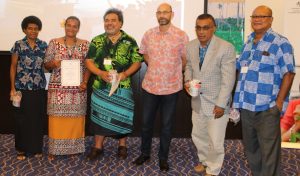

Maika Tabukovu (second from right) with other participants at the Regional Agriculture and Forestry Symposium held in Nadi last week.
Fiji National University (FNU) PhD scholar, Maika Tabukovu highlighted the significance of coconut plantations as a valuable economic and social resource for many communities in Fiji.
Tabukovu was speaking at the Regional Agriculture and Forestry Symposium held in Nadi last month on the topic ‘Proposed value chain analysis for veneer-based engineered wood products (EWPS) manufactured from Fijian-grown coconut palm’.
He highlighted that an emerging issue was many of Fiji’s coconut plantations becoming senile, which resulted in a significant reduction in the fruit production.
He said the removal of senile palms and replanting with newer varieties was necessary to restore industry viability, but it was a costly exercise.
He also mentioned that the removal of senile coconut stems alone provided huge financial benefits for the coconut farmers where it allowed an opportunity for replanting of coconuts and intercropping of small term crops before coconut became matured for harvesting.
“Currently, coconut water has become a major health drink in the US market and other products like virgin oil, etc.; therefore, coconuts play a major role in rural livelihood enhancement,” Tabukovu said.
“The new technology (spindleless lathe) which involves the peeling of senile coconuts provides opportunities in producing high value coco veneer products meeting the market needs from a low value resource.”
“The new technology will maximise the utilisation of senile coconut stem of about 70 to 75 percentage and a recovery of 80 per cent of finished products. Production of high-quality plywood from senile coconuts will contribute to the reduction of imported low grade plywood into the country.”
“The availability of senile coconut stems will reduce the pressure of logging native species as a substituted raw material.”
He added that more investment was needed by the industry for the benefit of rural and urban communities.
“The land is available and reviving the industry should have a major contribution to the GDP, this will reduce or stop the migration of rural population to urban areas,” he added.
“Also, replanting of young coconut trees will contribute to climate mitigation. Young coconut trees will sequestrate carbon dioxide from the area compared old coconut trees which are releasing carbon dioxide in the atmosphere.”
“Reviving the coconut industry is the way forward for Fijis’ economy as it did in the past as one of the major foreign earnings,” he said.